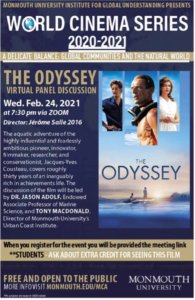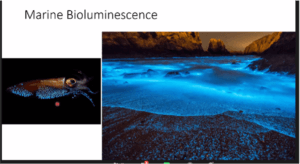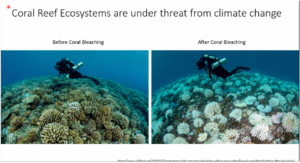By Madison Hanrahan
 On February 24, the Institute for Global Understanding (IGU) co-hosted a virtual discussion of the film The Odyssey. Hosted by Dr. Thomas Pearson, Professor of History, the discussion featured UCI Director Tony MacDonald, Esq. and Dr. Jason Adolf, Associate Professor of Biology and Endowed Associate Professor of Marine Science. The virtual discussion was an invigorating and highly educational reflection on the current state of the oceans and how they impact human life and activities.
On February 24, the Institute for Global Understanding (IGU) co-hosted a virtual discussion of the film The Odyssey. Hosted by Dr. Thomas Pearson, Professor of History, the discussion featured UCI Director Tony MacDonald, Esq. and Dr. Jason Adolf, Associate Professor of Biology and Endowed Associate Professor of Marine Science. The virtual discussion was an invigorating and highly educational reflection on the current state of the oceans and how they impact human life and activities.
The Odyssey is a 2016 French film directed by Jérôme Salle. Salle is a former art director and filmmaker who began working on The Odyssey in 2012, using two biographies of Jacques-Yves Cousteau, the French explorer, conservationist, television star, filmmaker, and innovator. Producing this film proved challenging for Salle, as the film takes place on the world’s oceans and focuses heavily on cinematic underwater shots below the ocean’s surface. Additionally, creating a plot for this film was difficult because Cousteau was such an accomplished and complex character, which is why the movie focuses on his son Philippe and on their father-son relationship.
The sea fascinated Cousteau, who created a television show to document his awe of the oceans. The film follows Cousteau’s son, Philippe, who works on the show with his father and realizes that human pollution harms the ocean and believes humans should protect and conserve the ocean rather than try to conquer it. Cousteau’s and Philippe’s contrasting ideas and priorities create tension throughout the movie, driving the narrative. Throughout the film, both father and son discover that they must come together to protect the oceans and become advocates to protect the planet from human pollution.
Approximately 40 participants attended the discussion and provided their insights on the film. Tony MacDonald first offered his commentary, stating that the film’s main theme is perseverance. He drew comparisons to the recently launched Mars Rover to demonstrate how a government agency heavily funds space exploration, costing $2.7 billion annually, while ocean exploration has an annual budget of only $45 million a year. This comparison highlights how neglected our oceans are in terms of research and science. He then explained how the work at the Urban Coast Institute (UCI) helps fill the gaps of what we know about the oceans. For instance, the UCI focuses on both ocean exploration and underwater philanthropy and has a 47-foot research vessel for major research at the university.
Nex t, Dr. Jason Adolf offered his comments about the film and on oceanic research. He discussed how little is known about the ocean due to the lack of funding and exploration. As his research focus is on phytoplankton and light in the ocean, he discussed the technology that one would need to see and photograph the ocean at different depths, as well as the bioluminescence of marine life. With less light in the water at greater depths, there is less color in the environment. Additionally, there is a special bioluminescence in plankton and in other sea creatures, though little research is available. There is a wide variety of marine animals that use bioluminescence, but since humans can see blue light, the blue light disguises the special fluorescence.
t, Dr. Jason Adolf offered his comments about the film and on oceanic research. He discussed how little is known about the ocean due to the lack of funding and exploration. As his research focus is on phytoplankton and light in the ocean, he discussed the technology that one would need to see and photograph the ocean at different depths, as well as the bioluminescence of marine life. With less light in the water at greater depths, there is less color in the environment. Additionally, there is a special bioluminescence in plankton and in other sea creatures, though little research is available. There is a wide variety of marine animals that use bioluminescence, but since humans can see blue light, the blue light disguises the special fluorescence.
 Dr. Adolf then explained how coral reefs are the most threatened marine habitats due to climate change. These reefs are susceptible to temperature change, as 90 percent of Earth’s excess heat is held at the oceans’ surface. As a result of rising temperatures, there will be a mass coral bleaching that will destroy all coral reefs.
Dr. Adolf then explained how coral reefs are the most threatened marine habitats due to climate change. These reefs are susceptible to temperature change, as 90 percent of Earth’s excess heat is held at the oceans’ surface. As a result of rising temperatures, there will be a mass coral bleaching that will destroy all coral reefs.
To raise awareness and support for protecting the oceans, Tony MacDonald suggested engaging everyday citizens in science and the environment, especially to give youth a voice in the matter. Youth activist groups are passionate about and dedicated to their goals, and they will be the ones to inspire great change for ocean research. Educating and organizing groups on a local level to focus on environmental issues would be a valuable first step to raise awareness about the oceans’ status and research gaps.
By the end of the discussion, it was clear to all that climate change is a topic that demands our urgent attention. Preserving the planet, and in particular the oceans, needs to be a high priority for governments around the world as pollution affects us all. Pollution has become such a devastating problem to our environment that humans are killing the oceans faster than we can uncover their mysteries. By not preserving the oceans, the Earth and its people will struggle to survive. Cousteau and Philippe were the first two people who understood the value of protecting the oceans from pollution.
